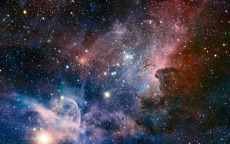
Space. The final frontier. Or, at least, that’s how Star Trek chose to describe the vast expanse of universe surrounding our tiny dot of a planet. As a collective culture, the human race has become more and more fascinated with the concept of not only space, but the presence of life other than ours. The first popular piece of fiction depicting other life was not exactly a pleasant one: H. G. Wells’ ‘War of the Worlds’ describing the brutal invasion of grotesque, cranial creatures, hell bent on claiming this world for their own use. In light of the new Star Wars trailer, it seems appropriate to discuss not only past, and currently examples of space in fiction, but also why it is so popular.
The first episode of the popular science fiction franchise ‘Star Trek’ was aired in 1966, only a few years prior to the moon landing by the NASA in 1969. Set in the future, the series describes an organisation known as Starfleet, who aim to explore the universe, cataloguing new planets and new life and most famously ‘to boldly go where no man has gone before’. The original series, focusing on the crew of the Starship Enterprise, interestingly enough didn’t depict alien life in a solely negative manner. Conversely, the humans were the ‘invaders’ rather than the new life forms discovered, although they sought to learn rather than to conquer. The friendships formed between many non-human characters and the protagonists were completely different to Well’s tale. The date of its pilot was also during the height of the Cold War, between America and Russia, where outsiders were seen as dangerous enemies. However, not only was the message of learning from other cultures the basis of the show, but one of the protagonists was also a native Russian. This sense of adventure, education, acceptance and above all hope, were, as the universe was further explored, continually themed in the show.
‘The Hitchhiker’s Guide to the Galaxy’ by Douglas Adams, is another form of science fiction, which focuses on the sense of adventure, inspired by the wider universe around us. Despite beginning with the destruction of the earth, its slightly more comical tone still manages to create a feeling of awe and wonder at the marvels of the galaxy: A ship with an improbability drive, for example, which conjures up one thousand monkeys typing Shakespeare, a planet, which is actually a factory for other planets. It is a giant computer, which can answer the greatest question of all time, and is a restaurant at the end of the universe. These fantastical wonders are a few of the spectacular things found by Arthur Dent, the last human in existence, on his journey. Though slightly more sarcastic and cynical in its outlook (that may be due to Adams being English, and Star Trek an American creation), it inspires a sense of adventure into things greater than just the world around us.
Of course, these are not the only franchises that see humankind’s journey into the cosmos as the next great adventure. Guardians of the Galaxy, Battlestar Galactica and the renowned Star Wars are a few more of many. It is oddly beautiful that humanity is able to look up at the majesty of the night sky, and be inspired by the possibilities, rather than fear future threats. Hopefully, this dreaming will continue, not only providing us with more fantastical stories, but values that, when we do reach the stars, we will hold true.
Image: http://i.telegraph.co.uk/multimedia/archive/02357/eso-summary_2357457k.jpg

0 Comment:
Be the first one to comment on this article.